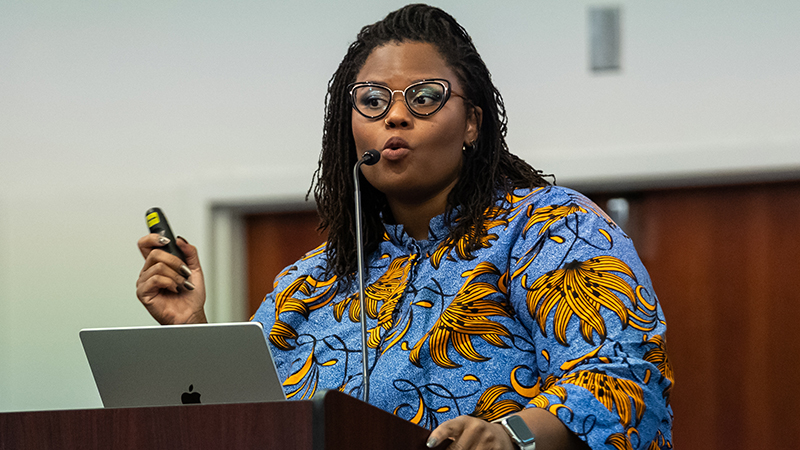Monica Bell ’03 explores the power of poetry to bring change

The church was suspicious of her plans. Her peers weren’t going to college, and no one in her family had gone. But Monica Bell ’03 was determined.
She attended Furman on a full scholarship, 45 minutes away from her Pentecostal church in Anderson, South Carolina, and the mobile home where she had lived with her mother and sister.
“I’ve just always been a nerd. I’m useless for most things in life,” she said with a laugh that invites you to join her. “I had to go to college, because – Was I supposed to take up a trade? It produced a lot of anxiety. It wasn’t so much like, ‘But I must go to college.’ It was more like, ‘I am only useful in things like speech and debate, student government, doing math well.”
Bell is a professor of law and associate professor of sociology at Yale University. Before she received tenure in 2021, she was the first Black woman to be a tenure-track faculty member at Yale Law School. She was a political science and sociology double major at Furman, a Truman Scholar and Mitchell Scholar, earned an M.Sc. from University College Dublin, a J.D. from Yale and a Ph.D. from Harvard University.
Bell lives in Brooklyn, New York, where she is thoroughly at home, enjoying the beauty and fashion scene, the coffee shops, museums and restaurants.
“One reason I wanted to move back here from (Washington) D.C. is I’m really into makeup and beauty,” she said. “Also, there are a lot of writers in New York, so that’s also a support system, and for queer communities, too.”
Set apart from the beginning
Bell was “undoubtedly one of the most inquisitive students I ever taught,” said professor Jim Guth, who was the first to encourage her to pursue a Ph.D, calling her “one of Furman’s finest graduates.”
“She was never willing to take a professor’s arguments on face value without demanding more evidence,” recalled Guth, the William R. Kenan, Jr. Professor of Politics and International Affairs.
“That combination of innate intellectualism and healthy skepticism is what has made her a rigorous thinker and a fine scholar. And although she and I are far apart politically, I always take her arguments very seriously.”
Learning from Don Gordon, executive director of The Riley Institute, and Erik Ching, the Walter Kenneth Mattison Professor of History, during a study away trip to Southern Africa developed Bell’s interest in the world. And she said Glen Halva-Neubauer, chair of the Department of Politics and International Affairs, “changed my life’s course in multiple directions, urging and supporting me to do my first internship.” Bell later served as a legal fellow at the Legal Aid Society of D.C. after clerking for a U.S. District judge.
Poetic representation
Bell visited Furman in November to give a lecture held by The Tocqueville Center for the Study of Democracy and Society. She spoke about “50 Mothers,” a project based on her interviews with low-income Black women in Washington, D.C. She hadn’t selected them for their involvement with the District’s child protective services agency but learned that most were affected by the agency.
Bell is crafting poems from the interviews, capturing the women’s sense of being surveilled, of not being believed by the authorities, of being tattled on by others and fearing that their children would be taken away for reasons such as having a dirty house. At the center of the project is the idea that poetry is not a luxury but a way to use narratives to drive policy changes. “50 Mothers” also explores themes of the panopticon, a prison system that leads the inmates, who don’t know when they’re being watched, to police themselves.
The interviews often ended with a woman hugging Bell.
“There are ways in which projects like this can be viewed as exploitative,” she said, adding that sociologists now rightfully question how they engage with marginalized communities.
Although, Bell was interviewing Black women who were largely her own age, the power imbalance between researcher and subject remained. But she said the women understood it and sometimes commented on the process.
“They recognized that a lot of times they’re being disbelieved, it’s not necessarily fellow Black women who are doing it,” said Bell, “and I think that changed the entire nature of the dynamic.”